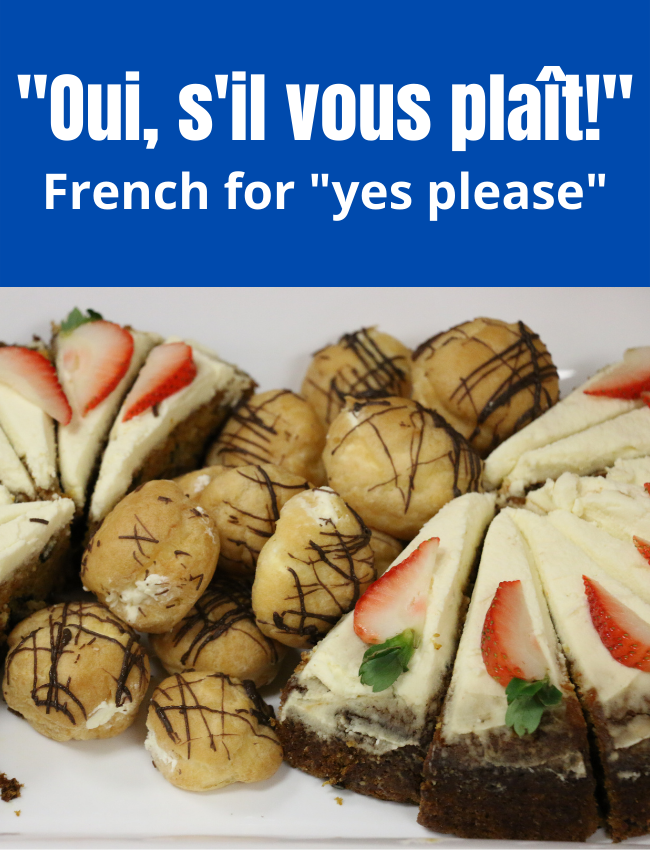
How do you say yes in French?
It’s hard to believe how many different ways there are to say yes in French. But depending on how exactly you use the word yes in French can completely change its meaning.
When I first moved to France, I had studied French in high school and college, but none of my textbooks taught me the variability and nuance of the word yes. Of course, I knew the translation of yes in French to be oui, but I didn’t learn other versions like ouais, ouaip, and mouais.
But, whether you’ve never spoken a word of French in your life or you’re further along in your French-learning journey, you’ve definitely seen oui somewhere. From brand names to t-shirts, the word oui can be seen around the world.
Origins of the word “oui”
But, as soon as you step into a French-speaking country you’ll be amazed by how many different ways you can say oui. The word yes in French has transformed over the centuries and was actually originally written as oïl in old French. It came from the Latin word hoc ille, which meant “this he did/said.”
Today ouais, ouaip, and ouaiche are all different forms of oui, which we’ll dive into soon. This list will include French phrases that include the word oui. But, I’ll also dive into French words and phrases that don’t contain the word oui, but either translate to “yes” in English or translate to common “yes” synonyms.
Easy Ways to Say Yes in French
Before we explore some of the more unique ways to say yes in French, let’s get started with some of the easiest ways.
Oui
Oui is definitely the most popular translation of “yes” in French. It is also one of the most versatile.
You can use oui in formal and informal situations. You can also use it with friends as well as strangers.
Example:
Est-ce qu’on a du lait ? Do we have milk ?
Oui. Yes.
Ouais
Ouais is another way to say “yes” in French and translates very similarly to “yeah” in English. Not quite French slang, but this form of yes is something you’ll commonly hear among the young.
This is definitely an informal form of oui so I wouldn’t say it in formal situations. French teachers can definitely get frustrated with students that say ouais. And strangers could be put off by your casual manner if you use ouais with them.
Example:
Tu veux prendre un café à 14h ? Do you want to get a coffee at 2 o’clock?
Ouais, j’aimerais bien. Yes, I’d like that.

Ouaip/ouep
Ouiap or ouep are two different spellings of the French word “yep.” Similar to ouais, the word ouiap is a more informal version of oui.
You can use this word in many of the same situations as ouias, but ouiap is usually used on its own. Ouais can be used on its own as well, but it can be used to start a sentence whereas ouaip will almost always exist on its own.
Example:
Est-ce que tu aimes le chocolat ? Do you like choclate?
Ouaip ! Yep!
Mouais
This form of yes in French is one of my favorites. It’s similar to ouais except for you keep your lips together for an “m” sound at the beginning.
There are two main ways to use mouais in French. The first way is to use it when you’re not very enthusiastic about something.
Example:
Est-ce que tu veux aller à la plage demain ? Do you want to go to the beach tomorrow?
Mouais, pas vraiment. Yeah, not really.
But, the second is used when you’re not sure you believe something.
Example:
Je vais t’acheter un cadeau demain. I’m going to buy you a present tomorrow.
Mouais…. Sure…
Si
If you’ve ever taken a Spanish class, the French word si might take some getting used to. In French, the word si means yes, but only when responding to a negative question or statement.
It’s a little tricky, but si is basically a stronger form of oui used to disagree with or correct someone. Let’s go through a few examples for this one.
Example:
L’Espagne n’est pas en Europe. Spain isn’t in Europe.
Si ! Yes it is.
Tu n’habites pas à Paris, n’est-ce pas ? You don’t live in Paris, right?
Si ! Yes I do.
Oui, s’il vous plaît.
Oui, s’il vous plaît is how you say yes please in French. You can use this in all types of formal situations where you’d like to be polite.
You can also drop the oui and simply say s’il vous plaît, which is also a polite way of saying yes.
Example:
Est-ce que vous aimeriez la carte des desserts ? Would you like the dessert menu?
S’il vous plaît. Please.

Yes in French Phrases
Now that we’ve talked about some of the most common translations of “yes” in French, let’s go over some French phrases with the word oui. This is where you’ll see how placing the word oui with other words can change its meaning.
- Oh que oui !
This is one of my favorite ways to agree with someone in French. Oh que oui is similar to “oh yeahhh” in English or “totally.”
Example:
On va bien manger ce soir. We’re going to eat well tonight.
Oh que oui ! Oh yeahhh we are.
Ah ça oui.
This phrase is used when you want to agree enthusiastically to something. It can either be used to agree with one option or another or just a single option.
If that doesn’t make it totally clear, here’s an example:
Elle est très depensière. She is a big spender.
Ah ça oui. Tu peux dire ça. Oh yeah, you can say that.
- Ah oui !
Ah oui means “oh yes” in French. The French use it when you remember something or when you’re excited about something.
You might also hear “Ah oui !” be shouted out in a sport’s bar if someone’s team wins or finds something interesting or surprising.
Example:
Est-ce que tu sais où tu as laissé tes clés ? Do you know where you left the keys?
Elles ne sont pas dans ma poche ? They’re not in my pocket?
Non. No.
Ah oui ! Ils sont sur le frigo. Oh yes, they’re on top of the fridge.
Oh oui
Similar to ah oui, oh oui can mean “oh yes” or “oh yeah.” Oh oui can also be used when you remember something or in the place of “oh right.” It’s also used to enthusiastically agree about something.
Mangeons de pizza ce soir. Let’s eat pizza tonight.
Oh oui, faisons ça. Oh yes, let’s do that.
Oui, chef!
Yes sir and yes ma’am definitely aren’t as common as they are in the United States. But, yes sir/ma’am does exist in French and it translates to oui, chef. Chef means “boss” so this isn’t something you’d say to your father or mother. It’s rather something you’d use either ironically with your friends or in a really formal setting. Oui, chef is how you say yes sir in the French army.
Example:
Wife: Est-ce que tu peux faire la vaisselle avant ce soir ? Can you do the dishes before tonight?
Husband: Oui, chef! Yes, sir/ma’am.
Ma foi, oui.
Ma foi, oui is an outdated way to say “yes, why not?
You might also hear it shortened to simply ma foi, which just means “why not?,” but translates directly to “my faith.”
Since it’s a little outdated you might only hear older generations use it. But, sometimes younger people will use it ironically.
Est-ce que tu veux un café ? Do you want a coffee?
Ma foi, oui. Why not?
Mon cul, oui.
Despite its similar sentence structure, mon cul, oui is not at all similar to ma fois, oui. In French, mon cul, oui is an expression of denial, opposition, or doubt.
It literally means “my a**, yes” and can translate as “no way,” “never” or “yeah right.” Similar to how you wouldn’t say a** in front of your grandmother, cul isn’t a word you should repeat in front of just anyone.
Example:
L’Italie va gagner la coupe de rugby cette année. Italy is going to win the rugby cup this year.
Mon cul, oui. Yeah, right.
Ben, oui
Ben, oui is something you’ll hear pretty often from the French. It’s used similarly to “duh” or “doy” or “uh, yeah.”
You’ll basically use it when someone tells you something that is already obvious.
Example:
Un plus un fait deux. One plus one is two.
Ben, oui. Duh.
Oui, oui
The French use oui, oui, to show frustration or to show you already know something. It’s pretty much used exactly like “yes, yes.”
Il faut juste attendre dix minutes. You just have to wait ten minutes.
Oui, oui. Yes, yes.
- Eh bien oui !
Eh bien is actually a common phrase on its own and can mean “well” or “so.” When combined with oui, it means “well, yes” or “so, yes.”
Example:
Tu penses que j’ai beaucoup de travail aujourd’hui ? Eh bien oui, j’en ai. You think I have a lot of work today? Well yes I do.
Mais oui.
Mais oui is definitely a phrase you will hear in French. It means “obviously” and “yes” and is used in informal situations. But it translates directly to “But, yes.”
The word but in French can be used in a few ways, but here you’ll usually use it when you’re agreeing with someone.
Je préfère les montagnes que la plage. I prefer the mountains over the beach.
Mais oui, moi aussi! Yes, me too!

Eh, oui.
Eh, oui is a French phrase which places emphasis on the “yes.” But, specifically, it places emphasis on the certain emotion you’re saying that yes with. It could be anger, compassion, or insistence.
It can be directly translated to “oh yes!”
Example:
Est-ce que je suis vraiment obligé d’aller à l’école aujourd’hui ? Do I really have to go to school today?
Eh, oui ! Oh yes you do.
Est-ce que tu est embêté ? Are you annoyed?
Eh, oui, je suis embêté ! Oh yes, I am annoyed!
Oui, en effet.
This is a rather formal way of saying yes in French. You can use oui, en effet to mean “yes indeed.” It’s often used in university or business settings.
Est-ce que c’est vrai que George Washington était le premier président américain ? Is it true that George Washington was the first American president?
Oui, en effet. Yes indeed.
Oui-da
If you remember ma foi, oui, oui-da is another outdated way to say yes in French. It translates to “yes indeedy” or “you bet.”
It’s pretty rare to hear nowadays, but you might come across someone who just loves to say oui-da. P.S. It can also be written as oui-dà.
Est-ce que vous pouvez m’aider ? Can you help me?
Oui-da. Yes indeedy.
Other ways to say yes in French
No matter what language you speak, you know there are many ways to respond affirmatively to a question or statement besides “yes.” Well, the same is true in French. Below you’ll find a list of other ways to say yes in French:
- Carrément – hell yes!
- Certes – certainly (very formal)
- Bien sûr – of course
- OK – okay
- Tout à fait – indeed
- Absolument – absolutely
- Assurément – without a doubt
- D’accord – okay
- Parfait – perfect
- Je t’en pris/Je vous en pris – by all means
- Sans aucun doute – definitely
- Certainement – certainly
- À vos ordres – aye-aye
- Affirmatif – affirmative (formal and mostly used in the army)
